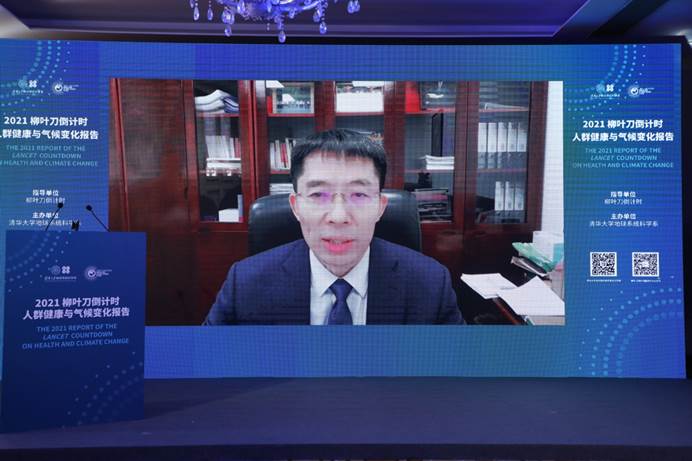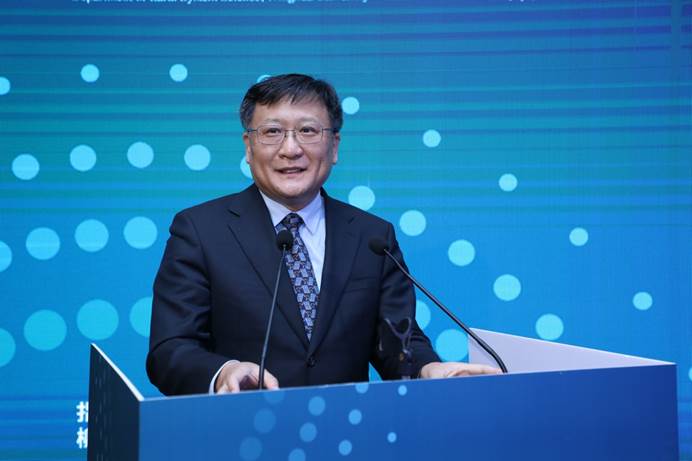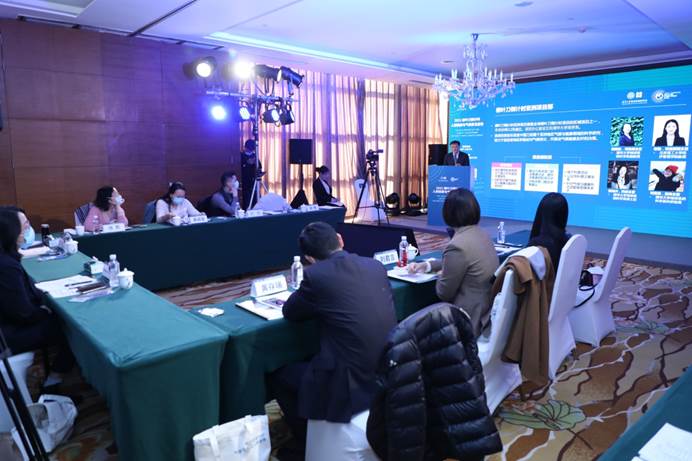On November 8, 2021,the Press Conference on the 2021 Lancet China Countdown Report on Health and Climate Change (hereinafter the Report) was held in Beijing. Zeng Rong, Vice President of Tsinghua University, and Gong Peng, Co-chairman of “The Lancet Countdown” and Vice President of the University of Hong Kong, delivered speeches online, and Helena Wang, Executive Editor-in-Chief of The Lancet Asia attended and addressed the conference. The conference was held both online and offline. Dean Luo Yong and A/Prof. Cai Wenjia of the Department of Earth System Science, Tsinghua University attended the conference and interpreted the report.

Zeng Rong delivered an online speech
In his speech, Zeng Rong pointed out that Tsinghua University has always been attaching great importance to the two major national strategic issues of climate change and public health security, and the Department of Earth System Science has been making pro-active and significant contributions to these goals. The report aims to reveal the impact of climate change on people’s health, and to find a collaborative solution to climate change and public health problems. The preparation of this report is another significant endeavor made by the Department of Earth System Science, Tsinghua University and its partners at home and abroad to build a multidisciplinary platform, employ systematic thinking and global vision to solve a compound crisis. Zeng Rong believed that the release of the report could enhance the whole society’s efforts to cope with the health risks of climate change, and meanwhile hoped that the Department of Earth System Science would continue to engage in high-level interdisciplinary research work to promote the solution of major issues of climate change and sustainable development in China and even around the world.
Ms. Helena Wang, Executive Editor-in-Chief of The Lancet Asia, expressed her heartfelt thanks to Tsinghua University for its contribution to The Lancet Countdown Report, which, as she introduced, focuses on climate change and human health, and as a sub-report, and is of great significance because it offers strong scientific basis for relevant authorities to formulate policies and guidelines.
Gong Peng introduced how climate change and health have become a new popular subject. He believed that the research on climate change and health is rising under the impact of globalization, which not only spans many disciplines, but also involves many temporal and spatial dimensions. Gong Peng noted that The Lancet Countdown Report has been published for many years in a row with considerable impact thanks to Tsinghua University’s encouragement of interdisciplinary research and the vigorous support of relevant scholars at home and abroad.
The report, written by 88 authors from 25 well-known institutions at home and abroad organized by the Department of Earth System Science in Tsinghua University, is a typical interdisciplinary research result, standing out as the only annual report in China that comprehensively demonstrates the impact of climate change and its countermeasures on the health of Chinese residents. Comprehensively applying the knowledge of climate science, epidemiology, geography, economics and other disciplines, the author team quantifies, by economic methods, the impact of health effects of climate change on the economy, evaluates the health co-benefits of adaptation and emission reduction policies by epidemiological methods, and provides specific policy suggestions to decision makers. Since its first release last year, The Lancet Countdown China Report has been highly recognized by the leaders of the National Health Commission, who have instructed relevant departments to fully consider the health environment, especially the impact of climate change factors, in the Health China Action. At the same time, the report has also drawn extensive attention from the media, forming a brand that comprehensively reviews the relationship between climate change and health in China.
2021 was marked by frequent occurrence of climate extremes around the globe. In China, for example, from the rare cold waves in some areas in January to the extreme precipitation in Henan in July, such extremes demonstrated the increasingly severe challenges incurred by climate change. In the light of extreme weather events that the public is highly concerned about this year, the report refines the assessment precision of the impact of climate change on human health and the response progress to the provincial level, and draws the Atlas of China’s Climate Health Risks by constructing more than 20 monitoring index systems.
The report has found that over the past year China has made significant progress in dealing with many aspects of climate change-related health risks. By the end of 2020, 12 provinces in China had completed or were making provincial health adaptation plans. In addition, the area of urban green space in 18 provinces has continuously increased in the past decade. According to the survey, more than half of the Chinese people live in provinces with medium or above greenness level. In terms of energy investment, in 2020, low-carbon energy investment was 9.5 times that of coal investment, with wind power generation increasing by 15% and solar power generation increasing by 17%. But at the same time, the health risks from climate change in China are also aggravating. In 2020, the number of deaths related to heat waves in China amounted to about 14,500.
The report suggests that relevant departments should strengthen inter-departmental cooperation and formulate corresponding national and local climate and health adaptation plans. Meanwhile, we should strengthen China’s climate mitigation actions and ensure that health factors be included in China’s pathways of carbon neutrality. In addition, publicity should also be strengthened to raise public awareness of climate-health linkages.
In the round-table discussion session of the Conference, Researcher Xu Ying, Chief Scientist of Climate Change of the National Climate Center of the China Meteorological Administration, Researcher Wang Huaiqing, Director of the Jiangxi Eco-meteorological Center, Professor Huang Cunrui of Vanke School of Public Health, Tsinghua University, Director Liu Junyan, Manager of Greenpeace Climate and Energy Program and Head of Climate Risk Program of the International Union for Conservation of Nature (IUCN), discussed the impact of climate change on people’s health and how to deal with it, and answered questions from online audiences.

Luo Yong delivered a concluding speech
In his concluding remarks, Luo Yong expressed his hope that this report would be released as an opportunity to strengthen in-depth research among scientists and promote dialogue and exchanges between the academic community and decision makers. At the same time, he hoped that the report could further enhance the public’s ability and scientific knowledge to prevent extreme weather events, and that all people would work together to seize the opportunity period and create a win-win future of climate change and health.

Site of the Press Conference
This year marked the sixth year of cooperation between the Department of Earth System Science, Tsinghua University and the famous medical jounal The Lancet. In 2015, The Lancet published the report Health and Climate Change, which comprehensively reviewed the impact of climate change on human health for the first time. Following the launch of The Lancet Countdown Initiative, the Department of Earth System Science, as one of the leading units, participated in the writing of the countdown report every year. To help people better understand the impact of climate change, the Department of Earth System Science and Tsinghua University Academy of Arts & Design have integrated science and art in their first attempt to employ artistic expression to tell the contents of the report through stories and present the report with visual works of art, thus enhancing the interaction with the public. Related works have by far been exhibited in Tsinghua University Academy of Arts & Design.
Text: The Department of Earth System Science
Photos: Cao Wenpeng